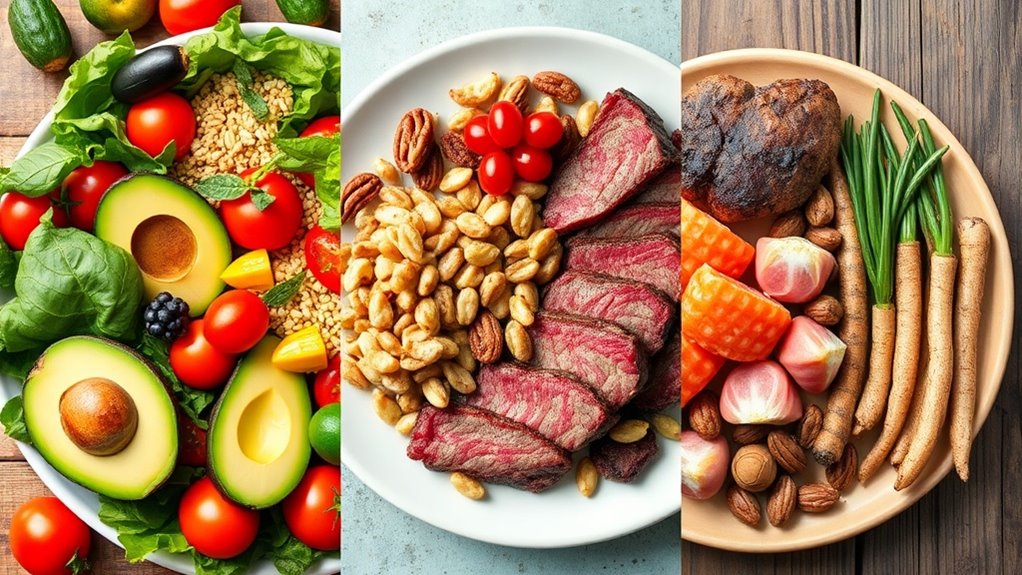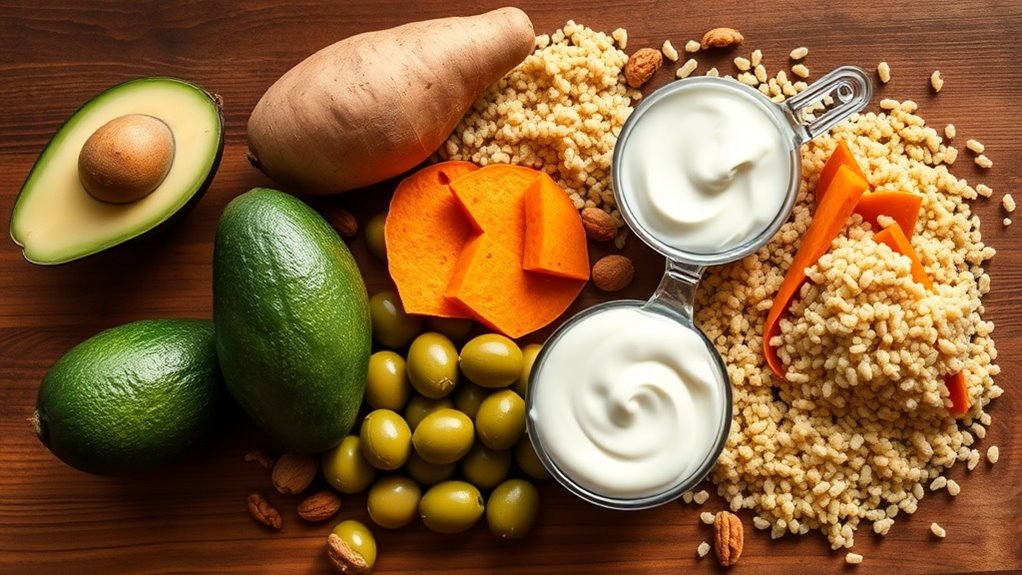The Truth About Low-Fat Diets (And Why You Might Be Gaining Weight)
You might think that low-fat diets are a golden ticket to weight loss, but the reality can be quite different. Many people unknowingly replace healthy fats with sugars and refined carbs, which can lead to unexpected weight gain. Understanding the truth behind these diets is essential, especially when it comes to how they affect your cravings and metabolism. Are you curious about what really happens when you cut out fats from your meals?
Key Takeaways
- Low-fat diets often replace fat with added sugars and processed carbs, which can lead to weight gain.
- Not all fats are bad; healthy fats from sources like avocados and nuts support metabolism and satiety.
- Low-fat products frequently contain hidden sugars and fillers, contributing to excess calorie intake and unhealthy choices.
- Reducing fat without considering overall calorie intake can slow metabolism and induce a starvation state.
- Sustainable eating focuses on whole foods and healthy fats, promoting balanced nutrition and long-term weight management.
The Science Behind Low-Fat Diets
Have you ever wondered why low-fat diets became so popular in the quest for weight loss?
Many believe cutting fat leads to easier weight loss, but this idea is rooted in low-fat myths.
Research suggests that when you reduce fat, you often replace it with sugars or processed carbs, which can lead to weight gain.
Additionally, fats are essential for hormone regulation and nutrient absorption.
Understanding that not all fats are bad is vital.
Healthy fats, found in foods like avocados and nuts, can actually promote satiety and support overall health, challenging the simplistic notion that fat equals weight gain. Moreover, incorporating healthy fats into your diet can boost metabolism and enhance satiety, further aiding in weight management.
Common Myths Surrounding Low-Fat Eating
You might think that low-fat foods are always the healthier option, but that’s not necessarily true.
Many low-fat products compensate for the lack of fat with added sugars, which can contribute to weight gain.
Additionally, it’s important to remember that calories still matter, regardless of whether they come from fat or other macronutrients. Furthermore, drastic calorie cuts can lead to a starvation state, causing your body to conserve energy and slow down your metabolism.
Low-Fat Equals Healthy
Many people believe that low-fat diets are synonymous with healthy eating, but this common myth oversimplifies nutrition.
While reducing fat can aid weight loss, not all fats are bad; healthy fats, like those from avocados and nuts, are essential for your body.
Low-fat products often replace fat with sugars and additives, leading to unhealthy choices.
Furthermore, focusing solely on fat content overlooks essential nutrients your body needs.
Instead of labeling foods as “good” or “bad,” aim for a balanced diet rich in whole foods, including healthy fats, proteins, and carbohydrates, to truly support your health and well-being.
Calories Don’t Matter
The idea that calories don’t matter in a low-fat diet is a prevalent misconception.
While it’s true that low-fat foods can often be lower in calories, they can also be misleading.
Many low-fat products contain added sugars and fillers to enhance flavor, which can lead to overeating.
You might think you’re making healthier choices, but those extra calories can add up.
It’s vital to evaluate both the quality and quantity of what you eat.
Balancing your calorie intake with nutrient-dense foods, regardless of fat content, remains vital for effective weight management and overall health.
Don’t overlook the power of calories.
The Role of Healthy Fats in Weight Management
Incorporating healthy fats into your diet is essential for effective weight management. These fats not only support metabolism but also enhance satiety, helping you feel fuller for longer. Additionally, healthy fats can improve cholesterol profiles, contributing to overall heart health.
Importance of Healthy Fats
Why do healthy fats often get overlooked in weight management discussions?
Many people associate fat with weight gain, but healthy fats actually play a vital role in your diet.
Incorporating them can help you manage weight effectively.
Here are three reasons to embrace healthy fats:
-
Satiety: They keep you feeling full longer, reducing the urge to snack.
-
Nutrient Absorption: Healthy fats enhance the absorption of essential vitamins like A, D, E, and K.
-
Balanced Hormones: They support hormone production, which regulates appetite and metabolism.
Embracing healthy fats can make a significant difference in your weight management journey.
Metabolism and Fat Consumption
Healthy fats not only contribute to satiety and nutrient absorption but also play a significant role in metabolism. When you include healthy fats in your diet, your body efficiently uses them for energy, helping to maintain a balanced metabolic rate.
Research shows that fats like omega-3s can enhance insulin sensitivity, which is essential for regulating blood sugar levels.
Additionally, healthy fats support hormone production, including those that regulate appetite and metabolism.
Satiety and Weight Control
How can the inclusion of healthy fats in your diet influence your feelings of fullness and weight management?
Healthy fats play a vital role in promoting satiety, helping you feel satisfied longer.
Here’s how:
- Nutrient Absorption: Fats aid in absorbing fat-soluble vitamins, enhancing meal satisfaction.
- Hormonal Response: Healthy fats stimulate hormone production that signals fullness, curbing hunger.
- Flavor and Enjoyment: Incorporating fats improves food flavor, making meals more enjoyable and reducing cravings.
How Low-Fat Products Can Mislead Consumers
Are you aware that choosing low-fat products mightn’t always be the best decision for your health?
Many people assume these items are healthier, but low-fat doesn’t mean low-calorie.
Manufacturers often compensate for reduced fat by adding sugars and artificial ingredients, which can lead to weight gain.
Additionally, low-fat labels can create a false sense of security, prompting you to consume larger portions.
It’s essential to read nutrition labels carefully and focus on whole, nutrient-dense foods rather than just fat content.
Furthermore, many low-fat products can be comparable to high sugar content options, which contribute to excess calorie intake.
The Impact of Sugar and Carbohydrates in Low-Fat Diets
Low-fat diets often lead consumers to overlook the significant role that sugar and carbohydrates play in their overall health.
Many mistakenly believe that reducing fat is enough for weight loss, but you might be consuming more sugar and refined carbs instead.
These can contribute to weight gain and other health issues.
Consider these points:
1. Increased cravings: Low-fat products often contain added sugars to enhance flavor, leading to more cravings.
2. Blood sugar spikes: High carbohydrate intake can cause fluctuations in blood sugar, impacting your energy levels.
3. Nutrient imbalance: Skipping healthy fats may lead to inadequate nutrient absorption.
Additionally, embracing carbs can lead to enjoyable meals while losing weight, as they are essential for energy and daily activities.
Choosing wisely matters!
Sustainable Eating: Finding Balance for Weight Loss
Sustainable eating emphasizes balance, variety, and moderation.
It encourages you to choose whole foods like fruits, vegetables, lean proteins, and whole grains while limiting processed foods and added sugars.
Research shows that adopting these habits can lead to more significant, long-term weight loss.
By listening to your body’s hunger cues and enjoying meals mindfully, you can foster a healthier relationship with food. This approach promotes mindful eating, which helps distinguish between hunger and emotional cravings.




